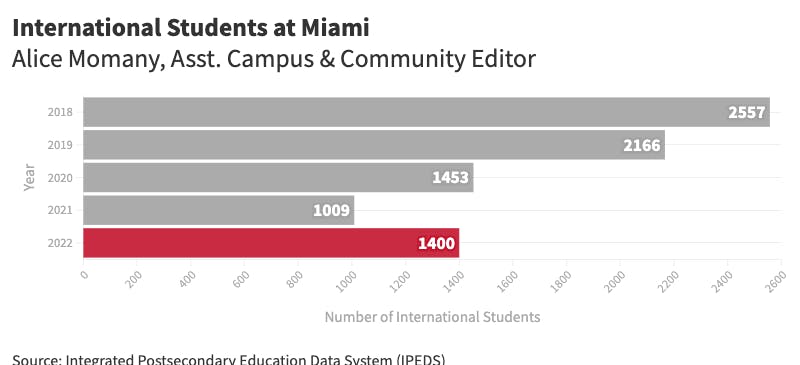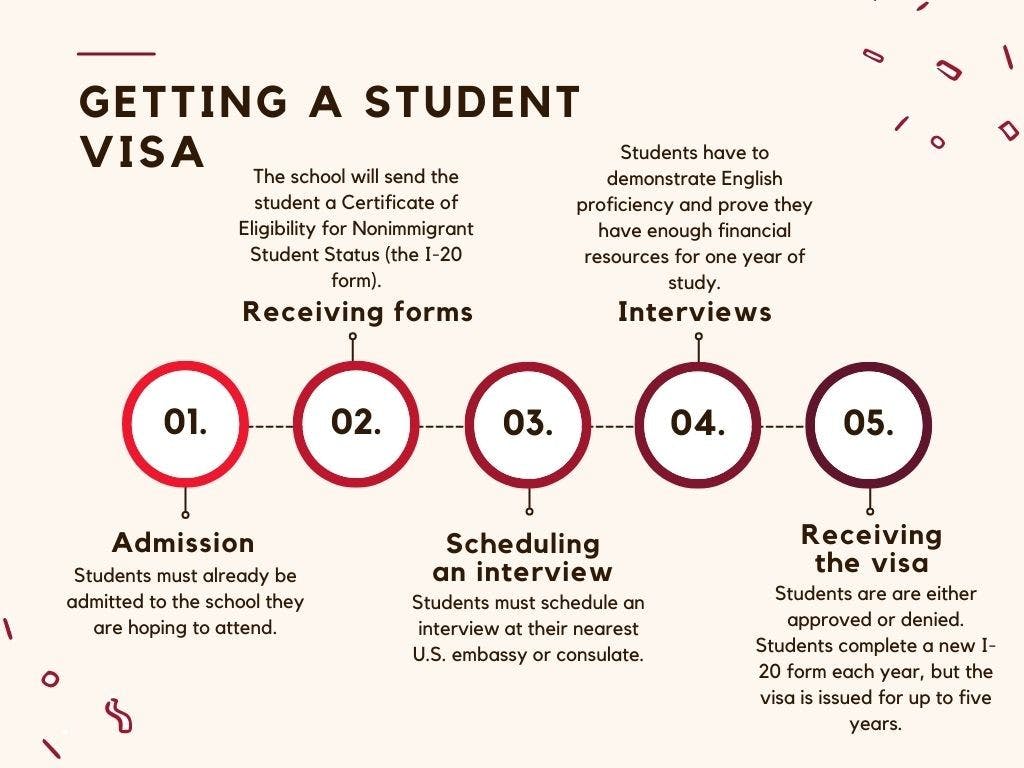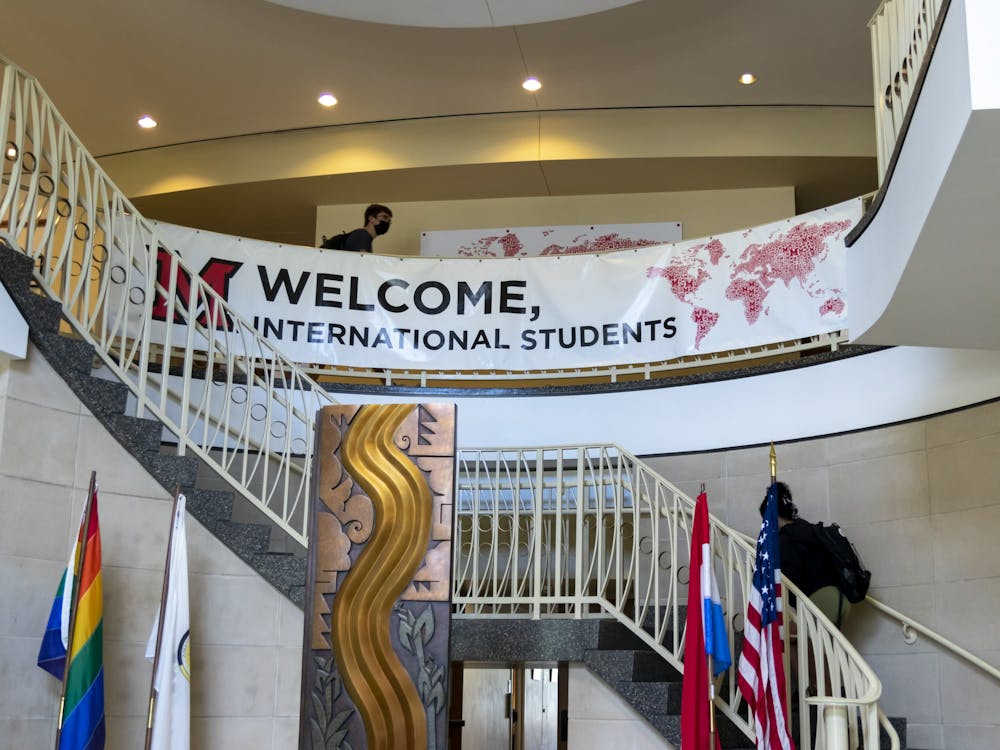In 2020, Peiyu Yang was excited to start his first year at Miami University, but he knew his experience would be different from most students.
Yang, a junior media and communications major, is an international student from Shanghai. Every year, he flies across the world to attend school.
"My high school Chinese teacher recommended I come [to Miami] because lots of my high school classmates also went to Miami," Yang said.
International student population faces steep decline since the pandemic
This year, Miami has students from 82 different countries, but the number of international students is lower than in previous years.
According to the Integrated Postsecondary Education Data System (IPEDS), in 2018, about 2,500 students came from other countries, about 13% of the student population. In 2021, the number decreased to about 1,000 international students, about 6% of the student population.
“We had seen a slight decrease already before COVID, but COVID really caused a significant decrease in our numbers,” Molly Heidemann, director of the International Student and Scholar Services at Miami, said.
This year, the number has increased. Heidemann said about 1,400 students are non-U.S. citizens, but international students still make up less than 10% of the student population.

Of all the countries Miami’s international students come from, China has seen the steepest decline in the wake of the pandemic.
“[Students from China] were 85% of our international student population at the height, and they’re still by far our number one … last time I checked maybe 58% of our international student population [is from China], but that’s a big decrease,” Heidemann said.
Enjoy what you're reading?
Signup for our newsletter
Although Heidemann said she isn’t sure what the cause of the decrease is, she suggested that COVID played an important role as well as changes in the Chinese economy, the one-child policy, nationalism and building up their own education system and political relationships.
William Xue, a junior studying emerging technology in business and design, said he took a gap year because of the pandemic.
Although Xue, from Jiangsu, China, didn’t face any issues renewing his visa, his parents advised him not to travel abroad for the 2021-22 school year. Xue took remote classes for the 2020-21 school year, but Miami did not offer remote learning for the 2021-22 school year.
“My parents didn’t want me to take a risk because of the COVID pandemic, so I just stayed at home for one year and prepared for my graduate applications,” Xue said.
Visa process for international students can cause complications
International students typically come to the U.S. on an F-1 student visa. To obtain a visa, the student has to be admitted to the school they plan to attend.
Once admitted, the school sends the student a Certificate of Eligibility for Nonimmigrant Student Status, the I-20 form. After receiving the form, students must schedule an interview at their nearest U.S. embassy or consulate.
During the interview, the student has to demonstrate English proficiency and prove they have enough financial resources for one year of study. The interviewer will ask the students questions about their purpose for going to the U.S., their intended major, why they want to go to school, how they intend to pay for their education and their long-term plans after school.
The interviewer then decides whether or not the student qualifies for a visa. Students complete a new I-20 form each year, but the visa is issued for up to five years.

Xue said although the application process takes time, he has never had a problem with getting approved.
“No, I’ve had no issues, mostly because I don’t think they will reject your application if you are approved to the college,” Xue said.
Although students can still be denied despite college approval, Yang agrees with Xue that the process is fairly easy.
“I think it’s not very hard,” Yang said. “I think it’s easy, but some people who are a first-year, they will be nervous because of the interview process.”
The pandemic caused consulates to shut down, preventing face-to-face appointments.
Heidemann said COVID isn’t preventing anyone from studying in the U.S. anymore, but they still have issues getting students to Miami. Because consulates were not operating, appointments were backlogged, and embassy workers are still trying to work through all the applications.
Not every student that applies can make it to Miami’s campus
About 15 students couldn't make it to Miami this year. Brent Shock, vice president of Enrollment Management and Student Success, said this number is typical. He said most students who are prevented from coming to the U.S. either didn’t get their visa approved in time, or their visa was denied.
“It was extremely difficult to get a visa in an appropriate amount of time to actually get here for the fall semester, so they had to request emergency appointments, which was a whole process,” Heidemann said. “Many of them were able to get an emergency appointment and get here, but we did have some that just were not able to get an appointment in time.”
Bethany Perkins, director of admissions, said Miami has no control over visa approvals.
“That is typically unfortunately something that belongs to the country and is the responsibility of the country,” Perkins said. “There are some countries that we already know tend to have higher denial rates, but that is not something that Miami can control.”
Perkins said both Kenya and Nigeria have higher denial rates. If a student is denied a visa, Perkins said they need to reapply and go through the application process again. If the student can't get an appointment, they can defer their admission.
“We work with those students and allow them to defer their admission to a later term, so they still stay in the fold,” Perkins said. “They’re able to maintain their scholarship [and] their admission decision, and we work with them closely for being able to arrive at a later time.”
Perkins said despite the fall in numbers, Miami is working to attract more international students.




